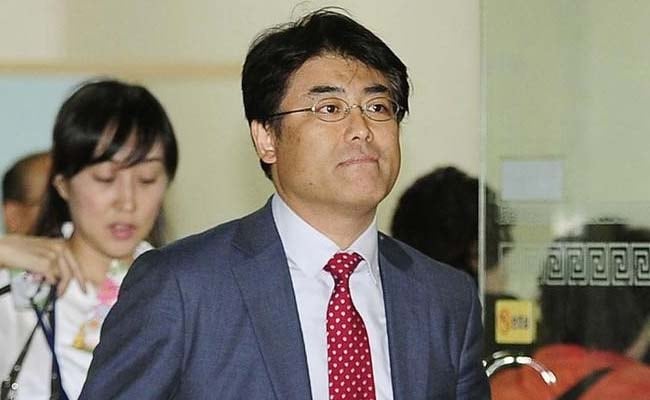
A Japanese journalist, on trial for allegedly defaming South Korean President Park Geun-Hye, headed home today after Seoul lifted a travel ban.
However, Tatsuya Kato, the former Seoul bureau chief of Japan's conservative Sankei Shimbun newspaper, must return to court later this month over his column regarding Park's whereabouts on the day the Sewol ferry sank a year ago, with the loss of more than 300 lives.
"Honestly, this is only the first step towards the resolution of a situation that defies common sense," Kato told Fuji News Network before leaving Gimpo International Airport for Tokyo's Haneda airport.
His column, published in the online edition of the Sankei in August, suggested the unmarried president had disappeared for an ill-timed tryst with her former aide.
The travel ban has been in force since days after the publication and was scheduled to end this month.
The next hearing for the defamation trial is set for April 20.
"The ban was lifted on humanitarian and other grounds," a senior prosecutor told AFP in Seoul.
"There was a consensus that hearings and debate on contentious issues have been almost completed, and Kato promised to come back after seeing his ailing mother," he added.
Kato has denied criminal libel, which could see him jailed for up to seven years, saying his objective had been to report the public perception of Park in the wake of the Sewol disaster.
South Korean defamation law focuses on whether what was said or written was in the public interest rather than whether it was true.
Japan's top government spokesman, chief cabinet secretary Yoshihide Suga, said he was pleased by the development.
"For our nation, this latest step is only natural," Suga said. "But the court proceedings are continuing. The Japanese government will continue to call on South Korea to take appropriate steps."
Media freedom group Reporters Without Borders has defended the Sankei journalist, while Japan has formally voiced grave concern over Kato's prosecution and questioned Seoul's commitment to press freedom.
Park's former aide, Jeong Yun-Hoe, testified in court that the Sankei column had presented "groundless slander" as fact rather than rumour.
Jeong had worked as an adviser for Park while she was still a lawmaker, but quit his position in 2007 several years before she successfully ran for president.
The Sankei, a robust centre-right daily that has campaigned to reverse an apology from Japan for forcing Korean women into wartime brothels, has suggested it is being singled out by Korean authorities.
The case has aggravated already-strained relations between Seoul and Tokyo.
Track Latest News Live on NDTV.com and get news updates from India and around the world

